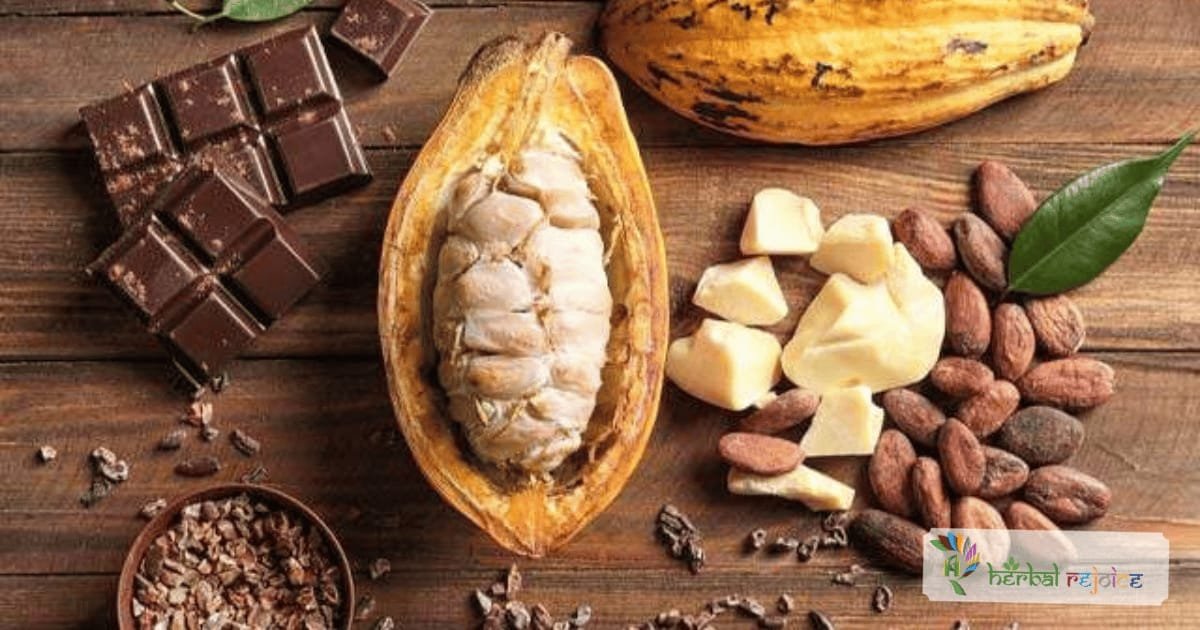Introduction:
Cocoa, scientifically known as Theobroma cacao Linn., belongs to the Sterculiaceae family. It is native to tropical America but is now cultivated in South India and Orissa. Cocoa is used in the treatment of liver, kidney ailments, diabetes management, as a general tonic, and an astringent for diarrhea.
This article explores the various medicinal properties of cocoa, including its stimulant effects on the central nervous system, local anesthetic properties, and stimulating and diuretic properties of its seeds.
Additionally, we will discuss the uses of cocoa in traditional medicine, potential health benefits, and precautions to be aware of.

The Medicinal Properties of Cocoa:
1. Central Nervous System Stimulant:
Cocoa leaves contain cocaine, which acts as a central nervous system stimulant. However, it’s important to note that the use of cocaine is highly regulated and illegal in many countries. While traditionally used for its stimulant properties, its abuse potential and negative health effects make it an unsuitable choice for medicinal purposes.
2. Local Anesthetic:
Cocoa leaves also possess local anesthetic properties, attributed to the presence of cocaine. However, the use of cocaine as a local anesthetic is highly discouraged due to its potential for addiction and adverse effects. Safer and more effective alternatives are available in modern medicine.
3. Stimulating and Diuretic Seeds:
Cocoa seeds contain caffeine, a naturally occurring stimulant. This compound acts as a diuretic, promoting urine production and increasing kidney activity. Diuretics are commonly used to treat conditions such as edema, high blood pressure, and certain kidney disorders. However, it’s important to consult a healthcare professional before using cocoa or cocoa products for these purposes.
Traditional Uses of Cocoa:
In traditional medicine, preparations of cocoa are utilized to address various health concerns. Some common applications include:
1. Liver, Bladder, and Kidney Ailments:
Cocoa preparations were traditionally used to treat liver, bladder, and kidney ailments. The diuretic properties of cocoa may help in eliminating toxins from the body and promoting kidney function. However, it is crucial to seek medical advice before using cocoa as a treatment for any specific ailment.
2. Diabetes:
Cocoa has been used as a traditional remedy for diabetes management. It is believed to help regulate blood sugar levels and improve insulin sensitivity. However, scientific research on the effectiveness of cocoa in diabetes management is limited, and it should not be used as a substitute for medical treatment or dietary changes recommended by healthcare professionals.
3. General Tonic:
Cocoa has been used as a general tonic, believed to provide energy and improve overall well-being. The stimulating effects of cocoa, attributed to its caffeine content, may contribute to these perceived benefits. However, moderation is key, as excessive consumption of caffeine can have adverse effects on health.
4. Astringent for Diarrhea:
Cocoa preparations have been traditionally used as an astringent to treat diarrhea. Astringents help reduce intestinal inflammation and promote the binding of loose stool. However, it is essential to consult a healthcare professional for appropriate treatment options, as cocoa alone may not be sufficient to address severe cases of diarrhea.
Potential Health Benefits and Precautions:
While cocoa and cocoa products offer potential health benefits, it’s essential to exercise caution and consider the following points:
1. Migraine Headache:
Cocoa and cocoa products have been known to trigger migraine headaches in some individuals. Therefore, if you are prone to migraines, it is advisable to monitor your cocoa consumption and observe if it affects your condition.
2. Constipation
Excessive consumption of cocoa and cocoa products can lead to constipation. This is attributed to their high content of tannins, which have an astringent effect on the intestines. To prevent constipation, it is essential to consume cocoa in moderation and ensure an adequate intake of fiber and fluids.
3. Unapproved Herb:
Cocoa is listed among the unapproved herbs. This implies that its medicinal use and safety profile have not been extensively studied or approved by the commission. Therefore, it is crucial to consult a healthcare professional before using cocoa for any specific health condition.
Conclusion
In conclusion, cocoa, scientifically known as Theobroma cacao Linn., possesses several medicinal properties, including stimulating and diuretic effects. Traditional uses of cocoa encompass the treatment of liver, bladder, and kidney ailments, diabetes management, as a general tonic, and an astringent for diarrhea. However, it is important to exercise caution, consider potential health risks, and seek medical advice before using cocoa for medicinal purposes.
Frequently Asked Questions(FAQs):
What is cocoa (Theobroma cacao Linn.)?
Cocoa, also known as Theobroma cacao Linn., is a plant native to tropical America but now cultivated in South India and Orissa.
What are the medicinal properties of cocoa?
Cocoa has stimulant effects on the central nervous system, local anesthetic properties, and stimulating and diuretic properties of its seeds.
Can cocoa be used as a central nervous system stimulant?
Cocoa leaves contain cocaine, which acts as a central nervous system stimulant. However, the use of cocaine is highly regulated and illegal in many countries.
Does cocoa have local anesthetic properties?
Cocoa leaves possess local anesthetic properties attributed to the presence of cocaine. However, the use of cocaine as a local anesthetic is highly discouraged due to its potential for addiction and adverse effects.
How does cocoa act as a diuretic?
Cocoa seeds contain caffeine, which acts as a diuretic, promoting urine production and increasing kidney activity.
Can cocoa be used for liver, bladder, and kidney ailments?
Cocoa preparations have traditionally been used to treat liver, bladder, and kidney ailments. However, it is important to seek medical advice before using cocoa for any specific ailment.
Is cocoa effective in managing diabetes?
Cocoa has been used as a traditional remedy for diabetes management, but scientific research on its effectiveness is limited. It should not be used as a substitute for medical treatment or dietary changes recommended by healthcare professionals.
Does cocoa provide energy and improve overall well-being?
Cocoa has been used as a general tonic, believed to provide energy and improve overall well-being. However, moderation is key, as excessive consumption of caffeine can have adverse effects.
Can cocoa be used as an astringent for diarrhea?
Cocoa preparations have been traditionally used as an astringent to treat diarrhea. However, severe cases of diarrhea should be addressed with appropriate medical treatment options.
Can cocoa trigger migraine headaches?
Cocoa and cocoa products have been known to trigger migraine headaches in some individuals. It is advisable to monitor cocoa consumption if you are prone to migraines.
Can excessive consumption of cocoa lead to constipation?
Excessive consumption of cocoa and cocoa products can lead to constipation due to their high tannin content. It is important to consume cocoa in moderation and ensure an adequate intake of fiber and fluids.
Is cocoa considered an approved herb?
Cocoa is listed among the unapproved herbs by the German Commission E, meaning its medicinal use and safety profile have not been extensively studied or approved.
Can cocoa be used safely for any health condition?
It is crucial to consult a healthcare professional before using cocoa for any specific health condition to ensure safety and appropriate treatment.
Where is cocoa primarily cultivated?
Cocoa is native to tropical America but is now primarily cultivated in South India and Orissa.
What is the scientific name of cocoa?
The scientific name of cocoa is Theobroma cacao Linn.
Does cocoa have stimulating effects on the central nervous system?
Yes, cocoa has stimulating effects on the central nervous system, primarily attributed to the presence of cocaine in cocoa leaves.
Can cocoa seeds be used as a natural diuretic?
Yes, cocoa seeds contain caffeine, a natural diuretic that promotes urine production and increases kidney activity.
Should cocoa be used as a substitute for medical treatment?
No, cocoa should not be used as a substitute for medical treatment or professional medical advice.
Can cocoa have adverse effects on health?
Excessive consumption of cocoa can have adverse effects on health, such as triggering migraines or causing constipation. Moderation and considering individual health factors are important when consuming cocoa.





